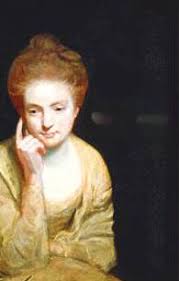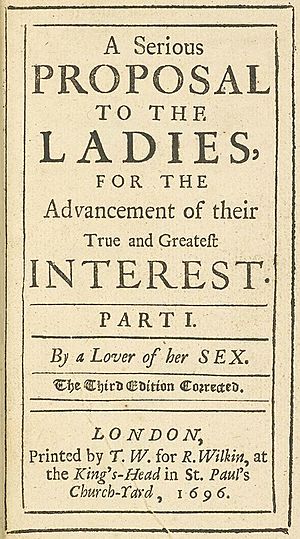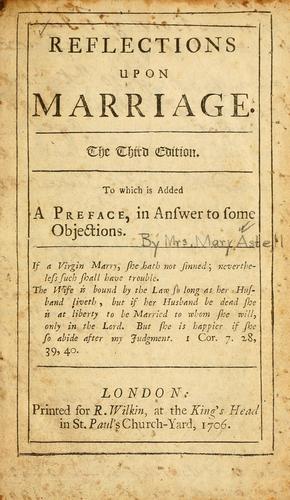Mary Astell facts for kids
Mary Astell (born November 12, 1666 – died May 11, 1731) was an English writer and thinker. She is known for being one of the first people to speak up for women's rights. Many people even call her "the first English feminist."
Mary Astell believed that boys and girls were equally smart. She argued that girls should have the same chances to get an education as boys. Her most famous books, A Serious Proposal to the Ladies and Some Reflections Upon Marriage, talked about these ideas. Her writings helped inspire other educated women later on. Mary Astell never got married. She spent most of her time with her female friends. Later in life, she helped start and run a school for girls. She saw herself as a strong, independent woman who wanted to help other women break free from unfair treatment.
Even though Mary Astell was a big supporter of women's rights, some people find it tricky to call her the "first English feminist." This is because she also had some very traditional political ideas. For example, she was a strong supporter of the king and believed people should always obey the government. These views might seem a bit old-fashioned, even for her time. Also, she thought religion was very important for women's friendships and ideas about equality. Some modern critics don't like this part of her work.
Contents
Early Life
We don't have many records about Mary Astell's early life. It was common for women in her time not to have many public records. We know she was born in Newcastle upon Tyne, England, on November 12, 1666. Her parents were Peter and Mary Astell. Her father was a coal merchant and a supporter of the king and the Church of England.
Mary didn't go to a formal school. Instead, her uncle, Ralph Astell, taught her at home. He had gone to Cambridge University and taught her about important thinkers like Aristotle and Plato. When Mary was 12, her father died. This meant she didn't have a dowry (money or property given to a husband when a woman marries). Because of this, her family's money went to her younger brother's education. Mary and her mother then moved in with Mary's aunt.
After this, we don't know much about Mary Astell's life until she was in her early twenties. She might have kept learning from her uncle. Her lack of a dowry and money might have made it hard for her to get more education or move up in society. We don't know if she had close friends or romantic relationships during this time. But her later writings show she was already thinking about women's education and equality.
Career and Writings

After her mother and aunt died in 1688, Mary Astell moved to Chelsea, London. There, she met many smart and important women. These friends helped her develop her ideas and publish her books. She also got help from William Sancroft, who used to be a very important church leader. He helped her financially and introduced her to a publisher.
Around this time, Mary Astell might have spent some time in a convent in France. There, she learned about ideas for women's education and independence. When she came back to England, she joined a group of intellectual women called the Bluestockings. This group met to talk about books, science, and philosophy. They often discussed women's education and equality, which helped shape Mary Astell's own work.
Mary Astell was one of the first English women to say that women were just as smart as men. She argued that women deserved to be educated. In 1694, she published her first book, A Serious Proposal to the Ladies. In this book, she suggested creating a college just for women. This college would help women learn and grow their minds. In 1697, she published a second part to this book, explaining how women could improve their thinking.
In 1700, Astell published Some Reflections upon Marriage. In this book, she looked closely at marriage in England during the 1700s. She warned women about the dangers of choosing a husband too quickly or without thinking. She argued that education would help women make better choices in marriage. It would also help them handle the challenges of being married. Astell said that women should look for a husband with "a good Understanding, a Vertuous Mind." She also said that there should be as much equality as possible between husband and wife.
In 1709, Mary Astell stopped her public writing. She became the head of a charity school for girls in Chelsea. Two wealthy women, Lady Catherine Jones and Lady Elizabeth Hastings, paid for the school. Mary Astell designed the school's lessons. It is believed to be the first school in England with only women on its governing board. When she was 60, Mary Astell moved in with Lady Catherine Jones. She lived there until she died in 1731.
Mary Astell died in London. In her last days, she didn't want to see anyone. She stayed in a room with her coffin, thinking only about God. She was buried in the churchyard of Chelsea Old Church in London.
Mary Astell is remembered for her ability to debate with others. She also found new ways to argue for women's place in society. She used philosophical ideas, especially those of René Descartes, to make her points. Descartes believed that the mind and body were separate. This idea helped Astell argue that women, like men, had the ability to reason. Because of this, she felt women should not be treated unfairly. She famously asked, "If all Men are born Free, why are all Women born Slaves?"
Important Ideas
Friendship
Mary Astell had important ideas about friendship between women. She believed that true friends loved each other for who they really were, not just for what they could get from the friendship. She thought that real, good friendships came from God's love. This meant that friendship was a spiritual bond. She even believed this love should extend to one's enemies, because God's love includes everyone.
Education for Women
Mary Astell never had a formal education herself. She strongly believed that women should be educated in a special environment, away from society. She thought the world was too influenced by men. So, women should get an education free from male influence. Even though she suggested creating a school for women, she never saw it happen during her lifetime.
Astell argued that women should get the same education as men. She also believed that women should be able to choose not to marry if they didn't want to. If they did marry, she felt they would have to follow their husbands' wishes.
Mary Astell thought education was key for women to become independent thinkers. In her book, "A Serious Proposal to the Ladies," she pushed for schools just for women. She knew that education was important for women to gain social and intellectual freedom. This would help them break free from the limits placed on them by society. Astell challenged the idea that women were less intelligent than men. She said that women had the same natural ability to think as men. She argued for their right to learn and explore knowledge. Astell stressed that women needed to develop their minds and study subjects usually only taught to men, like philosophy and religion.
She criticized the limited education women received in her time. This education often focused only on home skills. Astell wanted a full education that would allow women to take part in society, have intellectual discussions, and contribute to public life.
Marriage
Mary Astell saw herself as a strong, independent woman. She was proud of her mission to help women without needing men's approval. She felt men often kept women in a lower position.
In her book, Some Reflections upon Marriage, Astell wrote about what marriage was like for women in her time. She focused on the story of a woman named Hortense Mancini who separated from her husband. Astell argued that marriage, which was meant to be a holy thing from God, had become flawed because of human weaknesses, especially men's. She warned women not to just obey their husbands without thinking. She also said that educating women would make them stronger and wiser.
Mary Astell never married herself. But her biographer, George Ballard, said that an important clergyman once asked her to marry him. However, the plans for the marriage fell apart, and Astell was disappointed.
Religion and Politics
Mary Astell was a very religious person and a strong supporter of the king. She often disagreed with the ideas of John Locke, another famous thinker of her time. She didn't like his ideas about religion and thought some of his writings were too skeptical about Jesus Christ. Astell believed that all humans are like brothers and sisters. She felt that pride makes us treat others as if they are different or less important.
Some people wonder how Astell could be a feminist and also have such traditional political views. She was against ideas like freedom of thought and other things that seemed to threaten the Church of England. At first, this might seem to go against her support for women's freedom to think for themselves. But scholars believe her feminism came from the idea that men and women are intellectually equal. This is why she didn't demand full political equality for women at the time.
Growing up, Mary Astell saw civil unrest and riots in Newcastle. This probably made her interested in politics. She admired King Charles I. She thought the kings and queens who came after him were not the rightful rulers of England. Her strong support for the king and her English patriotism led her to believe that it was better for some innocent people to suffer than for the government's authority to be broken.
Astell believed that everyone should obey the government, even if it meant suffering punishment. She argued that people should never go against the king, even if the king had total power. Locke disagreed with her views on this.
List of Works
Mary Astell's books were published without her name on them.
- A Serious Proposal to the Ladies for the Advancement of their True and Greatest Interest. 1694, 1695, 1696 1697 (two printings), 1701, 1703
- Some Reflections Upon Marriage, Occasioned by the Duke and Dutchess of Mazarine's Case; Which is Also Considered. London: Printed for John Nutt, near Stationers-Hall, 1700 1700, Also: 1703, 1706, 1730 (two editions)
- A Fair Way with Dissenters and their Patrons. Not writ by Mr. L – - – - – y, or any other Furious Jacobite, whether Clergyman or Layman; but by a very Moderate Person and Dutiful Subject to the Queen. 1704
- An Impartial Enquiry into the Causes of Rebellion and Civil War in this Kingdom: In an examination of Dr. Kennett’s sermon, 31 Jan. 1703/4. And Vindication of the Royal Martyr. 1704
- The Character of the Wisest Men. Re-printed and published by the Author’s Friends. 1704
- Moderation Truly Stated: or, a review of a late pamphlet, entitul’d Moderation a virtue, or the occasional conformist justify’d from the imputation of hypocricy. Wherein this justification is further consider’d, …. 1704
- Letters concerning the love of God, between the author of the proposal to the ladies and Mr. John Norris: Wherein his late Discourse, shewing, That it ought to be intire and exclusive of all other Loves, is further Cleared and Justified. Published by J. Noris, M. A. Rector of Bemerton near Sarum. The second edition, corrected by the authors, with some few things added. 1705, 1730
- The Christian religion, as profess’d by a daughter of the Church of England. 1705, 1717, 1730
- Bart’lemy Fair: or an enquiry after with: in which due respect is had to a letter concerning enthusiasm, to my Lord ***. By Mr. Wotton. 1709
- An enquiry after wit: wherein the trifling arguing and impious raillery of the late Earl of Shaftesbury, in his Letter concerning enthusiasm, and other profane writers, are fully answer’d and justly exposed. 1722
- (Attributed) An essay in defence of the female sex. In which are incerted the characters of a pedant, a squire, a beau, a virtuoso, a poetaster, a city-critick, &c. In a letter to a lady. Written by a lady. 1696 (two editions), 1697
- (Attributed) Six familiar essays upon marriage, crosses in love, sickness, death, loyalty, and friendship, written by a lady. 1696
Legacy
Mary Astell had a large personal library, which was unusual for a woman in her time who was also a published author. Her books often have her name written inside and many notes she made. These notes show how much she was involved in the scientific and philosophical discussions of her time.
Astell's ideas about women's education helped create the foundation for later women's rights movements. She challenged old social rules and helped open the way for better education for women. Her work still inspires discussions today about gender equality and how important education is for women to feel strong and independent. Mary Astell's amazing ideas about women's education are a lasting reminder of her importance as a feminist thinker and a champion for women's rights.
In 2021, a collection of 47 of Astell's books and pamphlets were found in the Old Library at Magdalene College, Cambridge. Many of these books had her handwritten notes. These notes showed, for the first time, how much she was involved in the science and philosophy of her time. Other collections of her work are kept at the British Library and the Northamptonshire Record Office.
The Mary Astell Academy in Newcastle upon Tyne is named after her. There is also a street named Mary-Astell-Straße in Bremen, Germany.
 | Isaac Myers |
 | D. Hamilton Jackson |
 | A. Philip Randolph |



